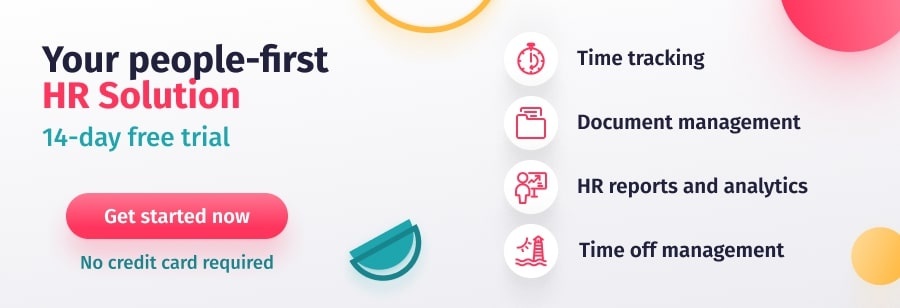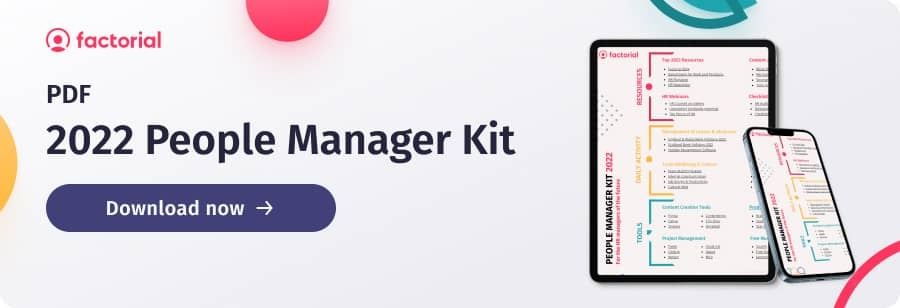The way businesses operate is evolving. Companies around the world are realizing the value of putting people first. It is the era of the employee experience where employees have become a central component of the economy. And this shift has led to the prevalence of an increasingly popular workforce management approach known as “people operations”.
- What is People Operations?
- People Operations Vs Human Resources
- People Operations Roles and Responsibilities
- Build a People Team from the Ground Up
- Tools to Support People Ops Professionals
- Factorial Performance Management Software ✅
In this post, we will take a look at how this approach differs from the traditional Human Resources model. We will also look at some of the roles and responsibilities of the people operations team and the tools that can help you get the most from this innovative, strategic approach. 
What is People Operations?
In its simplest terms, people operations, also known as people ops, is a person-first strategic approach to employment that takes a holistic view of progress, well-being, and results. It’s about creating a culture and environment that makes employees feel happy and proud to work at their organization.
Although the approach falls under the HR umbrella in terms of the smooth running of a company’s infrastructure, people ops focuses more on the human side of people management. For example, it’s about facilitating and improving all activities that help employees be more productive at work, from the moment they’re hired to the moment they leave. And this is done by humanizing business processes and continuously improving employee engagement, development, and retention.
The concept of people operations, as well as the term itself, was developed by Laszlo Bock, a former HR Director at Google. His belief was that individuals from companies with a culture and environment focused on employee happiness and wellbeing are far more likely to be dedicated, motivated, empowered and productive members of staff. And this dedication and motivation fuels business growth and boosts profits.
People Operations Vs Human Resources
The main difference between People Operations (PO) and Human Resources (HR) is that HR is primarily focused on legal compliance, ethics, and the structural organization of employees, whereas people operations is more concerned with results and strategies for employee engagement and effective management.
HR managers possess the qualities and skills to direct administrative functions and handle employee-related issues; people operations teams take it one step further and focus on the overall employee experience. In other words, HR is about the policies, and PO is about the people. And these differences represent an overall shift in business from a culture of compliance to a culture of autonomy.
People Operations is all about building a culture with clear boundaries and transparent processes so that your employees understand what is expected of them at each stage of the employee lifecycle. It deals with every aspect of the employee journey, from hiring to onboarding, performance reviews, promotions, and rewards.
People Operations responsibilities include:
- Managing the employee journey
- Collaborating with management to track workloads, production, and expectations
- Developing a people strategy
- Working with Internal Communications to develop the company culture
- Increasing employee value
- Analyzing metrics and providing insights for goal setting
- Monitoring working conditions, well-being, engagement and turnover rates
- Modernizing business systems and platforms
- Aligning the needs of employees with the overall mission of the company
People Operations Roles and Responsibilities
You are probably familiar with the HR manager role and the soft skills required to lead the HR department, but are you aware of the variety of positions contained within the people operations team? What’s more, each role within this department is responsible for a variety of important functions within a business. Each also requires specific skills, qualities and qualifications.
If you are a small business, then you may only require a People Operations Manager. However, if you are a large organization then you will probably benefit from creating a range of roles within a dedicated PO department, each with clearly defined career paths.
Let’s take a brief look at some of these roles and their primary responsibilities.
People Operations Manager
A People Operations Manager is responsible for managing overall team performance, much like the role of a project manager. The main focus of the PO manager is encouraging long-term employee development and happiness so that each member of the team feels valued and empowered.
Required skills: excellent people management skills; ability to train, oversee, coach, and mentor remotely; knowledge and experience in employment law, compensation, organizational development, employee relations, and training and development.
People Operations Director
A People Operations Director is responsible for leading, coaching, and overseeing the entire people ops team. Their main role is to develop and drive a people strategy at every level of the organization, ensuring policies support and improve the employee experience. They act as a champion for the company culture and support the company executives and team leaders, allowing the company to develop and grow.
Required skills: the ability to challenge conventional approaches and a willingness to build a unique approach; a good understanding of HR-related compliance matters and data protection requirements, including GDPR.
People Operations Consultant
A People Operations Consultant assesses company performance and identifies areas for improvement. This is an integral role within the People Operations team, that consults and liaises with all team leaders to ensure workforce management activities are aligned and support the employee experience. Responsibilities include developing people strategy audits, talent acquisition and branding, and the implementation of the right tools and technology.
Required skills: analytical thinking, strategic planning, communication and interpersonal skills; strong skills in problem-solving and communication; experience with consulting and project management.
People Ops Coordinator
A People Operations Coordinator performs admin duties and assists in project management. The main responsibility of the PO Coordinator is to ensure that the day-to-day operations of the company run smoothly. They play an essential role in the people operations team and collaborate on process optimization.
Required skills: employee-focused, detail-oriented and passionate about providing employees with the best possible experience.
People Ops Analyst
A People Operations Analyst is responsible for researching and identifying technical issues and proposing improvements. The main role of a PO Analyst is to oversee the Human Resource Information System (HRIS) so that all members of the PO team have real-time access to valuable workforce analytics. This ensures data integrity and legal compliance. It also helps other members of the PO team drive positive change and nurture the best possible employee experience.
Responsibilities include implementing and testing new systems that support HR processes. This includes payroll systems, performance management platforms, employee engagement metrics, and development and feedback systems.
Required skills: excellent communication skills; experience using statistical and database software; strong analytical and problem-solving skills.
Build a People Team from the Ground Up
Building a People Operations Team? In this episode of On Board: An HR Podcast, VP of People Daniel Illes discusses when and how to build the perfect People Team.
Tools to Support People Ops Professionals
We have already seen the extensive benefits that implementing a people operations team in your company can bring. However, for your people ops department to succeed, they need access to the right tools and resources. In fact, this lies at the heart of an effective PO program that creates true value for your business.
The first step is providing each member of your people operations department with the right tools, and this means digitalizing as many of your processes as possible. In other words, you need to give your employees what they need to engage with their jobs and be as productive as possible.
The right software solution and people management platform is crucial for boosting performance levels so that you can meet your growth targets and hit all your strategic objectives as a company. For example, you need digital tools for collecting workforce analytics, optimizing employee development, and measuring engagement. This is important because it will help you understand how your employees feel, what support they need, and what resources will help your managers lead more effectively.
With this in mind, we have prepared a comprehensive 2022 HR People Manager Kit with the goal of digitalizing your HR processes. Designed for people teams of the future, this handbook contains all the resources necessary to face all of your daily HR challenges.
All this will help you spend less time on paperwork so that you have more time for people and the overall well-being of your company.



